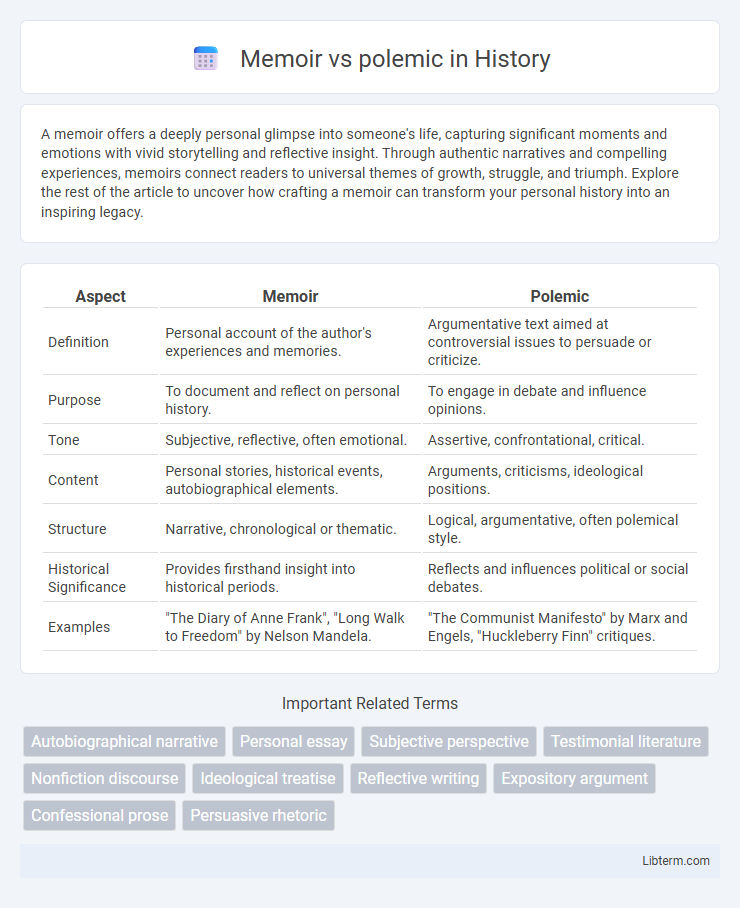A memoir offers a deeply personal glimpse into someone's life, capturing significant moments and emotions with vivid storytelling and reflective insight. Through authentic narratives and compelling experiences, memoirs connect readers to universal themes of growth, struggle, and triumph. Explore the rest of the article to uncover how crafting a memoir can transform your personal history into an inspiring legacy.
Table of Comparison
| Aspect | Memoir | Polemic |
|---|---|---|
| Definition | Personal account of the author's experiences and memories. | Argumentative text aimed at controversial issues to persuade or criticize. |
| Purpose | To document and reflect on personal history. | To engage in debate and influence opinions. |
| Tone | Subjective, reflective, often emotional. | Assertive, confrontational, critical. |
| Content | Personal stories, historical events, autobiographical elements. | Arguments, criticisms, ideological positions. |
| Structure | Narrative, chronological or thematic. | Logical, argumentative, often polemical style. |
| Historical Significance | Provides firsthand insight into historical periods. | Reflects and influences political or social debates. |
| Examples | "The Diary of Anne Frank", "Long Walk to Freedom" by Nelson Mandela. | "The Communist Manifesto" by Marx and Engels, "Huckleberry Finn" critiques. |
Defining Memoir and Polemic
A memoir is a personal narrative that documents an individual's lived experiences, emphasizing introspection and emotional truth, often structured around key life events. A polemic is a forceful written or spoken attack on a specific opinion, doctrine, or person, designed to persuade or argue a controversial position. While memoirs aim to provide a subjective account rooted in memory, polemics prioritize logical argumentation and rhetorical strategies to influence public opinion.
Historical Origins of Memoir and Polemic
Memoirs trace their origins to ancient civilizations, with early examples like Julius Caesar's "Commentarii" offering personal perspectives on historical events, emphasizing introspection and individual experience. Polemics date back to classical antiquity as well, notably in Socratic dialogues and religious controversies, serving as aggressive argumentative texts aimed at challenging opposing views. Both genres have evolved to reflect their historical contexts, with memoirs focusing on personal narrative authenticity and polemics on rhetorical persuasion and ideological conflict.
Purpose and Intent: Personal vs Persuasive
A memoir primarily serves to recount personal experiences and reflections, emphasizing individual growth and self-understanding. In contrast, a polemic aims to persuade readers by presenting strong arguments and challenging opposing viewpoints. While memoirs foster empathy through storytelling, polemics drive change by influencing opinions on specific issues.
Narrative Structure Differences
Memoirs typically employ a chronological narrative structure that emphasizes personal experiences and introspective reflections, creating a cohesive and immersive story arc. Polemics utilize a more argumentative and thematic structure, organizing content around specific claims and counterclaims to persuade or critique. This difference in narrative form influences how readers engage with the material, with memoirs fostering empathy and polemics encouraging critical analysis.
Tone and Voice Comparison
Memoirs evoke a reflective, intimate tone that invites readers into the author's personal experiences and emotions, often featuring a candid, introspective voice. In contrast, polemics adopt a passionate, assertive tone designed to challenge or provoke, using a combative, persuasive voice to argue a specific point. The memoir's voice fosters empathy and understanding, while the polemic's voice seeks to incite debate and persuade opposition.
Use of Evidence and Subjectivity
Memoirs rely heavily on personal memories and subjective experiences, using evidence from the author's life to provide an intimate and nuanced narrative. Polemics prioritize argumentative evidence, often presenting facts and data selectively to support a specific ideological stance while minimizing emotional or subjective elements. The use of evidence in memoirs tends to be introspective and interpretive, whereas polemics emphasize objective-sounding proof to persuade or challenge opposing viewpoints.
Audience Engagement Strategies
Memoirs engage audiences through personal storytelling, emotional resonance, and relatable experiences, creating a deep connection with readers by sharing authentic perspectives. Polemics capture attention by presenting strong, provocative arguments and appealing to readers' sense of justice or intellectual challenge, often encouraging debate and critical thinking. Both genres use targeted language and narrative techniques to maintain interest, but while memoirs evoke empathy and reflection, polemics drive engagement through persuasive rhetoric and controversy.
Cultural Impact and Influence
Memoirs offer intimate, personal narratives that shape cultural understanding by providing unique perspectives on historical events and societal issues, fostering empathy and diverse voices in public discourse. Polemics drive cultural impact through provocative argumentation and critique, challenging prevailing ideologies and sparking debate that can lead to social and political change. Both forms influence culture distinctly: memoirs cultivate personal connection and memory, while polemics mobilize collective action and ideological shifts.
Strengths and Limitations of Each Genre
Memoirs offer a deeply personal perspective, providing rich emotional insight and detailed first-person experiences that foster reader empathy and connection. The limitation of memoirs lies in their subjective nature, which may lack objectivity and comprehensive analysis, potentially leading to bias or selective memory. Polemics excel in presenting strong, persuasive arguments and rallying readers to a cause, though their confrontational style can alienate some audiences and reduce nuanced understanding.
Choosing Between Memoir and Polemic
Choosing between memoir and polemic depends on the author's intent: memoir offers a personal, reflective narrative grounded in lived experiences, fostering emotional connection and introspection. Polemic demands a persuasive, argumentative approach targeting social or political issues, aiming to provoke critical debate and change. Writers seeking to balance subjective storytelling with impactful commentary might blend elements of both genres for nuanced expression.
Memoir Infographic

 libterm.com
libterm.com